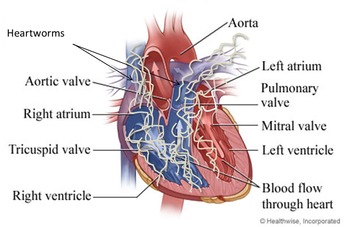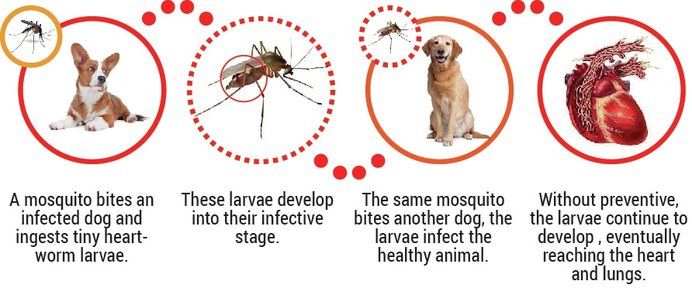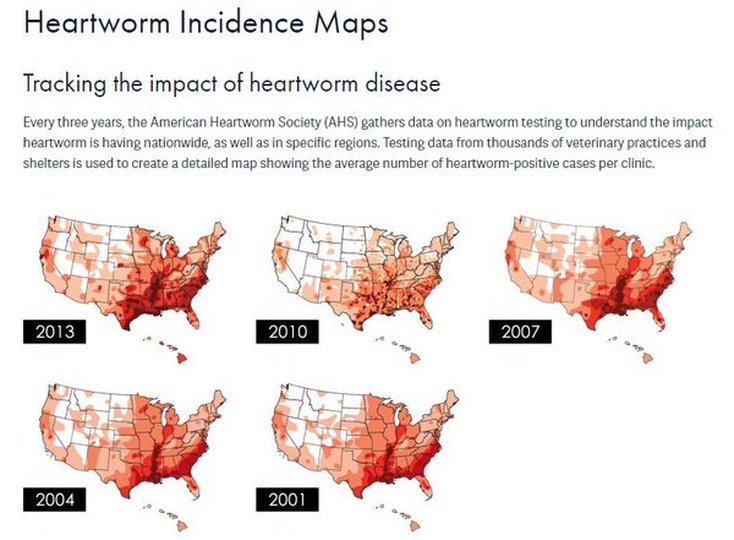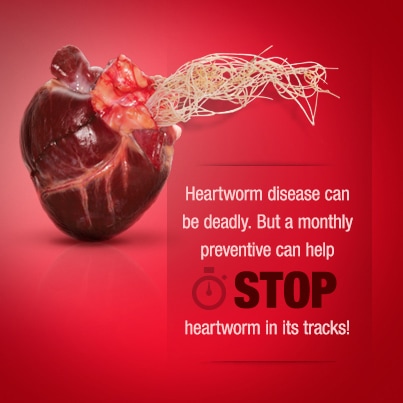|
What is a heartworm? Heartworms are one of the most preventable parasitic diseases in animals. A parasitic roundworm, it spreads from one dog host to another. It is a serious and potentially fatal disease caused by the heartworm, which are a foot-long, that live within the heart, lungs, and blood vessels. This can cause heart failure, lung disease and damage to other organs. What animals can get heartworms? Heartworm disease can affect dogs, cats and ferrets mainly. However they can also live within wolves, foxes, sea lions and coyotes (foxes and coyotes are fairly important carriers due to their general proximity to urban areas). Dogs are the primary host for heartworms which means the worms can mature and produce offspring. This also means that, if the dog goes untreated, they could potentially harbor hundreds of worms. Cats are an atypical host of the parasite. Most heartworms do not survive into adulthood when infecting a cat though this does not mean they cannot have adverse affects due to them. Because they only can only have younger heartworms in their system, cats generally go undiagnosed for this disease (the test used to find heartworms, tests for a specific part of the adult female parasite). The immature heartworms can cause a condition called Heartworm Associated Respiratory Disease (HARD). Another problem cats can face with this disease is the fact that the treatment for dogs cannot be utilized for cats. How do pets get heartworms? Heartworm larvae (microfilaria) are transferred from animal to animal via the mosquito. The mosquito plays the most essential role in the transmission of heartworms. Why should we use prevention? Heartworms can lead to severe problems with the heart, lungs, liver and kidneys, and can be fatal. In the past we have not had many cases here in Utah. However, since natural disasters such as Hurricane Katrina and Hurricane Sandy, dogs have been shipped around the country from places with higher occurrences of heartworm causing the spread of heartworms from those dogs to ours here. Below you can see the American Heartworm Society's maps from 2001 up to 2013 and below that the most current map from 2016. This data is gathered every 3 years to understand what regions are heavily impacted and which are growing in the amount of cases. These maps are only including those cases REPORTED by veterinary clinics. Meaning, there could be several variants or anomalies that impact the data we see. If you look at the 2010 map you can see that it looks like there were less incidences that year but also remember our economy was not doing very well at that time and many people could not afford to take their pets to the vet. Another note to consider is cost of prevention versus possible treatment (see comparison below in the next section).  Isn’t there a treatment if my dog contracts heartworms? There are treatments. However, they are costly and painful. The only medication used for treatment is called Immiticide. Immiticide uses arsenic in its production, which makes it difficult to reliably carry it since not many people are willing to work with it. Currently supplies of Immiticide come from France. We try to have some in stock but we can’t always guarantee that we will have it if we have multiple cases occur in the same time frame. This last year we had two dogs diagnosed with heartworms within about a week of each other. If we had had a third dog come in within that next month or two we would not have been able to treat them. Another problem we run into when it comes to treating with Immiticide, due to the arsenic in it, it can be very painful to the dog being treated. It has many potential side effects including but not limited to: anorexia, agitation with or without tremors and excessive salivation, fever, depression, possible respiratory reactions to the dead microfilaria and thromboembolism can be observed 7-20 days after treatment. The cost of prevention is much less over a life time than it is to handle the treatment if a pet contracts heartworms. For example, a 26-50lb dog that is on prevention its entire life consistently, lives to be about 10 years old. The cost of 10 years worth of prevention can vary from about $840-1100. The cost to treat that pet, if they did contract heartworms, is upwards of at least $2000 and possible complications due to the heartworms and the treatment could end up costing you much more in the long run. In what ways can heartworms be prevented? There are several options that we offer on prevention of this debilitating disease. These include the chewable tablets Heartgard and Tri-heart (a generic of Heartgard) as well as Proheart. Proheart is an injection that will cover 6 months of heartworm prevention. It also treats the common hookworm infections that may be present. Proheart can be more convenient than the Heartgard and Tri-heart because you only have to come in to the clinic every 6 months versus having to remember to give a pill every month but it can be more expensive depending on the size of your pet. If you have a larger dog it could actually be more cost effective to do the injection. How does the prevention work?
We give our pets prevention monthly. The reason is because the prevention works “backwards”. Meaning that, when we give our pet their dose of heartworm prevention it takes care of any heartworm they may have received in the past month. It only works on the stage of heartworm that is passed on from mosquito to pet. So what if your pet was wasn’t on heartworm prevention and was bit by a mosquito 2 months ago? Or 5 months ago? The best option at this point would be to get your pet on prevention and then in 6 months get a heartworm test. Wouldn’t I want to get a heartworm test done on my pet right away? Due to the way that a heartworm test works and picks up heartworms, it takes 6-7 months from the time that your pet is bitten to the time we can test positive for heartworms. The test reacts to hormones in the female worms that can only be picked up on the test when they are adults. When a mosquito transfers heartworms to your pet, worms are in a larvae stage that takes the full 6 months to grow. Even if you miss a dose of prevention on your pet you should get your pet heartworm tested 6 months from the time of the missed dose to make sure your pet is good to go. You should continue to give your pet their heartworm medication or call your veterinarian if you have any questions or concerns. If there is anything we didn’t cover about Heartworms and their prevention in this article please let us know! We can get your questions and concerns answered!
12 Comments
12/20/2017 09:46:25 pm
Very informative and useful... Keep it up the great work.
Reply
3/19/2018 02:14:26 pm
This is highly informatics, crisp and clear. I think that everything has been described in systematic manner so that reader could get maximum information and learn many things.
Reply
4/10/2018 07:05:28 am
The heartworm is one of the silent infirmities that does not become visible until further stimulation. This indisposition is caused by a parasitic worm called- 'Dirofilaria immitis'. Its extremity relies on- the reaction of the host, the duration of infestation, and the strength of worms present in the body. As compared to cats, dogs are more susceptible to heartworm malady. Dry cough, breathing difficulty, appetite loss, fatigue, weight-loss- are some of the clinical syndromes of heartworm malady. If you suspect that your four-legged companion has heartworm, call your vet- who can identify and treat the affairs implementing various trappings.
Reply
9/14/2018 06:27:34 am
That is such a communicable disease into dogs or other pets.. thanks to aware of that kind of disease..
Reply
5/22/2019 09:54:03 pm
Thanks for posting these symptoms of heartworm in dogs. I thought that the information in this post for treatments for dogs was really useful. Asking a vet to give my dog injections that can get rid of his heartworm seems really good to know.
Reply
10/13/2019 11:27:37 pm
I think this is a really good article. You make this information interesting and engaging. See more many wonderful posts on instagram in my site, please visit
Reply
7/13/2020 01:00:42 am
Really dangerous problem you are discussing. Please if your dog is having the same problem then you must take him for a check up.
Reply
12/22/2020 05:27:26 am
Greetings to each one, it's really a particular for me to visit this website page, it comprises of helpful Information.
Reply
10/7/2021 03:52:39 am
Very useful post. This is my first time i visit here. I found so many interesting stuff in your blog especially its discussion. Really its great article. Keep it up
Reply
Leave a Reply. |
Author:NOAH Staff Archives
April 2022
|



